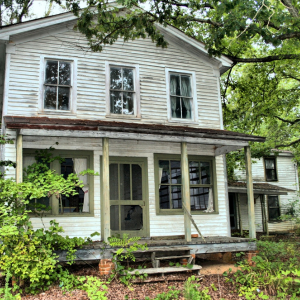
Historical Context of Squatters’ Rights in the United States
The roots of squatters’ rights in the U.S. trace back to the country’s westward expansion and early development. In the 1800s, settlers moving westward frequently occupied land without owning it legally, which gave rise to informal squatter communities.
This was common as pioneers sought new opportunities on unclaimed or government-owned land. Squatters, motivated by both economic necessity and the hope of a better future, played a central role in populating and cultivating large areas of the frontier.
As time went on, their presence pushed politicians to make some of these informal claims official. The Preemption Act of 1841 was a big change because it let squatters buy the land they had improved for cheap before anyone else could.
This move honored the work of the first settlers and added some structure to the ownership of land. Today’s property laws are a lot more complicated, but the history that early squatters built on is still heard in arguments about adverse possession and property rights in North Carolina and other states.
Understanding Squatters’ Rights: a Comprehensive Guide
In North Carolina, squatters’ rights—legally known as adverse possession—are a key part of real estate law. These rights are important for both landowners and individuals who may claim property through long-term occupancy.
In North Carolina, a squatter must live on the land continuously and openly for at least 20 years in order to fulfill strict requirements in order to possibly become a legal owner. Outsiders must be able to see this use clearly, and the owner must not be able to figure it out.
The use must also be unfriendly, which means it doesn’t have permission, and exclusive, which means that only the squatter is using the land. Property owners need to keep an eye on empty or unused land on a daily basis to keep squatters from claiming these rights.
Knowing how these rules work is valuable for both sides, whether you’re trying to protect property or understand how legal claims through occupancy might be possible.
The Role of Adverse Possession in Property Law

Adverse possession is a long-standing legal principle that plays an essential role in how property disputes are resolved. It gives someone who has occupied land for a long time—without the owner’s permission—a potential path to legal ownership, provided certain clear legal standards are met.
In North Carolina, those standards include living on the property continuously, openly, and exclusively for 20 years. The use must also be hostile, meaning done without approval from the rightful owner, and it must be obvious enough that anyone—including the actual owner—can see it’s happening.
This doctrine reminds landowners to actively manage and monitor their property, especially if it’s unoccupied. At the same time, it allows long-term users of neglected land to assert ownership if they’ve met the requirements. It’s a legal balance between protecting ownership rights and recognizing long-term, good-faith use.
Common Misconceptions About Squatters’ Legal Protections
There’s a lot of confusion surrounding squatters’ rights, and it often leads to overestimating how much legal protection squatters actually have. One widespread misconception is that someone can gain legal ownership of a home just by staying in it for a short while.
In fact, North Carolina law is very strict—squatters need at least 20 years of continuous, open, and hostile occupation to claim adverse possession. Another myth is that landlords are helpless against squatters. That’s not true; there are legal eviction options available, and owners can take action if someone is on their property without permission.
People also sometimes think squatters automatically receive the same protections as tenants with leases, which is false. Squatters only gain certain protections after meeting very specific conditions. Being clear about these facts helps owners and occupants better navigate their rights and responsibilities.
Legal Implications of Squatting in North Carolina
Squatting in North Carolina can have serious legal consequences, especially because it intersects with the doctrine of adverse possession. A person who meets all the legal criteria—such as 20 years of continuous, exclusive, and hostile use—could eventually claim legal title to a property.
That’s why people who own land should keep an eye on who uses it, especially if they’re not living there themselves. When it’s not clear if the conditions for adverse possession have been met or if the owner has done enough to protect their claim, a court case may happen.
Changes in laws or new court rulings can shift how property-related cases play out, adding more complexity to an already tricky subject. This is especially important if you’re trying to sell your house fast in North Carolina, where staying informed about the legal landscape can mean the difference between a smooth sale and unexpected delays. For both owners and claimants, understanding these legal shifts is key to avoiding unwanted surprises.
Recent Changes and Updates to North Carolina’s Squatting Laws

In recent years, North Carolina lawmakers have tightened the rules around adverse possession, reflecting growing concerns from property owners and communities alike. Traditionally, squatters needed to live on a property continuously for 20 years to claim ownership, but now, the bar has been raised.
Under new laws, squatters may also have to show they acted in good faith or had a “color of title,” meaning they believed they had a right to be there. In some cases, they must also pay property taxes during the occupation period.
These reforms are designed to prevent abuse of the system while still honoring legitimate long-term occupancy. As the legal framework evolves, it’s crucial for everyone involved in real estate—from investors to tenants—to stay updated on the latest developments.
Comparing Squatters’ Rights Across Different States
Squatters’ rights aren’t the same everywhere, and comparing laws across states helps show how North Carolina stacks up. In North Carolina, a squatter must occupy a property openly and exclusively for 20 years to claim it—a long timeline compared to states like Texas or California, where that period can be as short as five years.
Some states also allow for tacking, which means one squatter can build on another’s occupancy time. North Carolina doesn’t permit this, making it more difficult to meet the 20-year requirement. These differences show how state-by-state laws shape outcomes in property disputes.
Understanding these differences is crucial for anyone involved in real estate—particularly property owners or managers with assets across state lines. At the same time, if you’re looking to sell, we buy houses for cash in Greenville and throughout other areas of North Carolina, making the process fast and hassle-free.
The Ethical Debate Surrounding Squatters’ Rights and Housing Shortages
There’s a deeper ethical question behind squatters’ rights, especially in places like North Carolina facing affordable housing shortages. On one hand, adverse possession laws allow people who’ve lived in abandoned or unused properties to eventually gain ownership—a lifeline for those without stable housing.
Supporters argue that these laws help fill empty homes while providing shelter to the homeless. Critics, however, argue that it weakens property rights and sets a troubling precedent by rewarding unauthorized occupancy.
The real challenge lies in balancing private property rights with the human need for shelter. As housing costs rise, this ethical debate becomes even more relevant, pushing policymakers to find solutions that respect both perspectives.
Exploring the Relationship Between Homelessness and Squatting
The connection between homelessness and squatting is impossible to ignore in North Carolina, where housing shortages have driven many people to seek shelter in vacant buildings. With limited affordable housing, some individuals see squatting as their only option.
In some cases, squatters may eventually be able to claim ownership through adverse possession laws if they meet long-term conditions. But the real issue is systemic: a lack of accessible housing forces people into legal gray areas, and many property owners struggle with how to handle it.
Understanding this situation means acknowledging the real-world impact of housing insecurity, and recognizing that laws alone won’t fix the problem without broader policy changes.
The Impact of Foreclosure on the Rise of Squatting Cases
Foreclosures have played a big role in increasing squatting cases across North Carolina. When homes are foreclosed and sit empty, they often become targets for unauthorized occupancy. Squatters may move in, not necessarily to claim ownership, but simply for shelter.
This becomes a legal and financial issue for banks, landlords, and new owners who inherit these problems. Long foreclosure processes can also lead to extended periods of vacancy, giving squatters time to establish residency.
Rising housing costs and economic uncertainty are making things even tougher these days. If you’re involved in real estate, it’s important to understand how foreclosure and squatting can affect your property. The good news? Helping Home Solutions buys houses for cash in any condition—give us a call today, we’re here to help!
How Property Owners Can Prevent Squatting in North Carolina

Preventing squatting starts with proactive property management. Owners should regularly inspect vacant properties to ensure no unauthorized individuals are living there. This includes checking for signs of habitation—like lights on, changes to locks, or personal belongings on-site. Installing cameras or alarm systems can also act as deterrents.
Fencing, clear signage, and secure locks are physical barriers that help reduce risk. Additionally, maintaining clear records of ownership and responding quickly to any signs of trespassing are crucial. When property sits vacant for extended periods, it becomes more vulnerable to squatters—so property owners should consider temporary rentals or working with local property management services to monitor the site. Staying alert and taking early action is the best defense against a potential squatter situation.
How to Evict a Squatter in North Carolina?
Removing a squatter in North Carolina requires following the legal process step by step. Property owners can’t just force someone out—they must begin by confirming that the person is a squatter, not a tenant with a legal lease.
After that, an official eviction notice must be served, clearly stating the reason for the removal. If the squatter doesn’t leave, the owner must file an unlawful detainer claim in court. Gathering solid evidence—such as ownership documents and proof of unauthorized use—is vital.
A court hearing follows, and if the owner wins, law enforcement can remove the squatter. It’s strongly recommended to work with a qualified real estate attorney to ensure everything is done legally and effectively.
How Long Does It Take to Get Squatter’s Rights in NC?
In North Carolina, earning squatters’ rights through adverse possession takes 20 years of continuous, open, exclusive, and hostile occupancy. That’s two decades of living on someone else’s land without hiding it—and without getting permission.
The rightful owner must also take no legal action during that entire time. If they file a suit or take steps to reclaim the property, the clock resets. Squatters can’t take shortcuts; they must meet every condition to make a claim.
This makes the law tough but clear. Both property owners and squatters must understand these rules to avoid conflict and navigate their rights effectively.
What Is the Shortest Time for Squatters Rights?
In North Carolina, the shortest time to potentially claim squatters’ rights is still 20 years under standard law. Some states allow shorter durations, especially if the squatter has a “color of title” or has been paying property taxes—but that’s not the norm here.
To meet the requirement, the squatter’s use must be open, exclusive, and hostile, with no permission given by the rightful owner. For landowners, this means that even long-term unauthorized occupancy could eventually turn into a legal issue if left unchecked.
Regular property checks and prompt legal action can help prevent such claims from taking hold.
How Long Can Someone Stay in Your Home Before They Can Claim Residents in North Carolina?
In North Carolina, someone can’t simply stay in your home for a few weeks and claim residency. Under adverse possession laws, it typically takes seven years with color of title or 20 years without it for someone to potentially gain ownership.
This time must include open, hostile, exclusive, and continuous use of the property. It’s not enough for someone to just crash at your house—they must act like they own it and do so without interruption. Property owners should remain aware and proactive if someone is living on their property without a lease or permission.
Quick legal action prevents long-term problems and protects your rights as the legal owner.
Can You Remove a Squatter Without Going to Court in North Carolina?
Trying to remove a squatter without involving the court system can be risky and legally problematic in North Carolina. Property owners must follow the legal eviction process, even if someone is occupying the property without permission. Taking matters into your own hands—like changing locks, shutting off utilities, or removing belongings—can lead to legal consequences for the owner.
Instead, once it’s clear that the individual is a squatter and not a tenant, the property owner must serve proper notice and, if needed, file an unlawful detainer action in court. Attempting to bypass the law can result in claims of illegal eviction or even trespassing charges against the owner. Respecting due process is essential not only for legal compliance but also for preventing further complications or delays in reclaiming your property.
Helpful North Carolina Blog Articles
- Guide To Selling Your Home By Owner In North Carolina
- Understanding North Carolina Inheritance Laws
- Sell Your Home In Foreclosure In North Carolina
- Selling A House With Unpermitted Work In North Carolina
- Closing Costs Without A Realtor In North Carolina
- Mastering Contingencies In North Carolina Real Estate Sales
- Selling A Hoarder House In North Carolina’s Real Estate Market
- Understanding Squatters Rights In North Carolina
- How To Successfully Sell Your House With Tenants In North Carolina

| HOSTILE POSSESSION | NOTICE TO QUIT | EVICTED | TAXES | TENANCY | LAWSUIT |
| CIVIL COURTS | INSURANCE | INSURANCE COMPANY | INSURANCE AGENCY | TRESPASSER | TRESPASSING |
| PROPERTY TAXES | INFORMATION | SHERIFF | REALTY | EXCLUSIVE POSSESSION | MESSAGE |
| LIABILITY | LEGAL LIABILITY | LEASES | JUDGE | DEFINITION | RISK |
| REGULATIONS | QUIET TITLE | PREMISES | LEGAL DOCTRINE | LEGAL ASSISTANCE | LEGAL ADVICE |
| DUE PROCESS | DISCLAIMER | DATA | CRIMINALS | CRIMINAL OFFENSE | NORTH CAROLINA SQUATTERS |
| A CRIMINAL OFFENSE | A PROPERTY OWNER | NORTH CAROLINA CAN | FOR ADVERSE POSSESSION | AS A PROPERTY | CAROLINA SQUATTERS RIGHTS |
| NORTH CAROLINA PROPERTY | SQUATTERS RIGHTS IN | NORTH CAROLINA THE | NORTH CAROLINA A | IS A CRIMINAL OFFENSE | IN NORTH CAROLINA CAN |
| FOR ADVERSE POSSESSION IN | AS A PROPERTY OWNER | SQUATTERS RIGHTS IN NORTH | TO PAY PROPERTY TAXES | IN NORTH CAROLINA THE | NORTH CAROLINA SQUATTERS RIGHTS |
| NORTH CAROLINA A SQUATTER | IN NORTH CAROLINA A | IN NORTH CAROLINA ITS |
